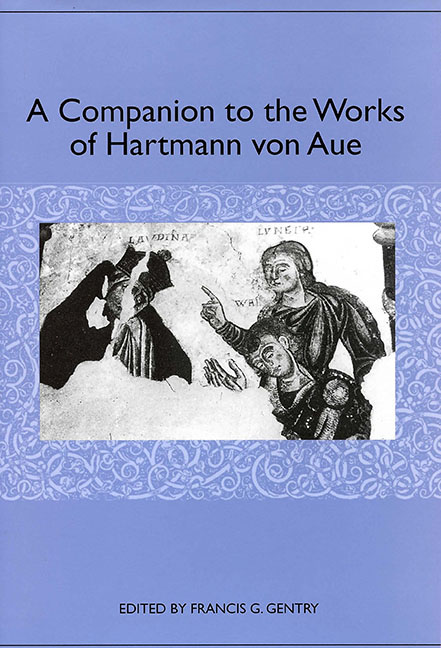Book contents
- Frontmatter
- Contents
- Acknowledgments
- Introduction
- Hartmann's Theological Milieu
- Hartmann von Aue as Lyricist
- Hartmann von Aue and Chrétien de Troyes: Respective Approaches to the Matter of Britain
- Gender and Love in the Epic Romances of Hartmann von Aue
- The Two-Fold Path: Erec and Enite on the Road to Wisdom
- The Body in Pain in the Works of Hartmann von Aue
- Illness and Cure in Hartmann von Aue's Arme Heinrich and Iwein
- Hartmann's Legends and the Bible
- Hartmann's Works in the Visual Arts
- The Medieval Literary Reception of Hartmann's Works
- A Tale of Sacrifice and Love: Literary Way Stations of the Arme Heinrich from the Brothers Grimm to Tankred Dorst
- Editions and Translations of Hartmann's Works
- Works Cited
- Notes on the Contributors
- Index
Hartmann's Legends and the Bible
Published online by Cambridge University Press: 27 April 2017
- Frontmatter
- Contents
- Acknowledgments
- Introduction
- Hartmann's Theological Milieu
- Hartmann von Aue as Lyricist
- Hartmann von Aue and Chrétien de Troyes: Respective Approaches to the Matter of Britain
- Gender and Love in the Epic Romances of Hartmann von Aue
- The Two-Fold Path: Erec and Enite on the Road to Wisdom
- The Body in Pain in the Works of Hartmann von Aue
- Illness and Cure in Hartmann von Aue's Arme Heinrich and Iwein
- Hartmann's Legends and the Bible
- Hartmann's Works in the Visual Arts
- The Medieval Literary Reception of Hartmann's Works
- A Tale of Sacrifice and Love: Literary Way Stations of the Arme Heinrich from the Brothers Grimm to Tankred Dorst
- Editions and Translations of Hartmann's Works
- Works Cited
- Notes on the Contributors
- Index
Summary
It is hardly startling to declare that the source — and in one case the principal source — for Hartmann's two religious legends, the Arme Heinrich and Gregorius is essentially the Bible (biblical allusions in the Arthurian works are a separate issue). Nevertheless, it is still sometimes forgotten just how much the words of the Bible, and quite specifically of the major biblical books taught in the schools — the Gospels in particular, then Genesis and the Psalms — make their way into and inform medieval literary texts, as they do a great many modern ones. However, even a statement as unsurprising as that requires considerable qualification: what is really meant by “the Bible” during this period and in this context? It is not simply a question of establishing which version of the Bible is involved, since we may point first to Jerome's Vulgate, although some variant readings and echoes of the Old Latin versions survived for a very long time, especially in the liturgy. Rather, consideration has to be given to what was meant by the Bible in a more general sense. Clearly a Latin version of the Old and New Testaments is implied, including what are now referred to as the deutero-canonical books, the Apocrypha. To this must be added, however, a range of accretions that expand the text by detailed literal exposition, and are afforded virtually biblical status: that the tempter in paradise was the devil, for example, rather than a talking serpent. Besides an awareness of the sensus litteralis (literal sense of scripture), the fact must not be lost sight of that Christian commentaries on the books of the Bible — and a glance at the two-hundred or so volumes of Migne's Patrologia Latina offers a graphic illustration of just how many such commentaries there were — merged the Old Testament with the New according to the spiritual senses of medieval hermeneutic, so that episodes from one were thought of firmly in terms of the other. Whether a medieval Christian audience (if such a generalization is admissible) could think of the story of Abraham's intended sacrifice of Isaac without having in mind the typology of the Crucifixion is a matter of debate.
- Type
- Chapter
- Information
- A Companion to the Works of Hartmann von Aue , pp. 141 - 160Publisher: Boydell & BrewerPrint publication year: 2004



